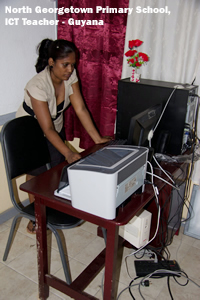The set of teacher competencies described in the framework are designed to facilitate improvements to school administration, teaching and learning, and teacher professional development, through the exploitation of technology. (1)
2 An Overview of Available Tools
The work described above involved advising and supporting ministries of education and teacher training institutions to strategise and implement key activities. This necessitated the development of tools designed to support these activities. Generic versions of the tools and some sample documents now comprise a powerful toolkit that can be harnessed to implement ICT in education professional development strategies for teachers. These tools are licensed under a Creative Commons Attribution license (2), and we encourage others who see value in them for supporting ICT in education activities in their country or institution to adapt and use them as they consider appropriate.
2.1 ICT Competency Framework for Teachers
A critical question is what are the ICT skills, values and proficiencies you want your educator community to strive towards? A good way to start answering this question is by interrogating the UNESCO ICT Competency Framework for Teachers. This framework provides a comprehensive set of essential competencies defined and agreed by an international committee of educators working under the banner of UNESCO.
 Its unique cyclical structure encourages teachers to develop their skills in ever more sophisticated ways. Early work focuses on digital literacy, a second band encourages a deepening of understanding and the third band calls for the application of knowledge through the creation of new teaching tools and products. These levels of sophistication approximate the developmental needs of students at both teacher training colleges and universities (education faculties). The framework calls for study, within each band, of the following education topics: the national education sector; curriculum; pedagogy; assessment and administration; ICT skills; and teacher growth. Consequently, the framework focuses primarily on education needs rather than technology per se and therefore sees technology in a supporting role.
Its unique cyclical structure encourages teachers to develop their skills in ever more sophisticated ways. Early work focuses on digital literacy, a second band encourages a deepening of understanding and the third band calls for the application of knowledge through the creation of new teaching tools and products. These levels of sophistication approximate the developmental needs of students at both teacher training colleges and universities (education faculties). The framework calls for study, within each band, of the following education topics: the national education sector; curriculum; pedagogy; assessment and administration; ICT skills; and teacher growth. Consequently, the framework focuses primarily on education needs rather than technology per se and therefore sees technology in a supporting role.
UNESCO has produced a document that outlines the underlying philosophy, the defined competencies and the framework which holds them together. A positive consequence of closely aligning ICT in education teacher professional development strategies to the UNESCO framework is that one can more easily identify open teaching courses and materials to support the training (there is an expanding pool of teacher training resources that cover UNESCO competencies), while also ensuring adherence to a globally recognised set of competencies and standards.
| UNESCO ICT Competency Framework for Teachers ( |
- Read more about the UNESCO ICT-CFT on the UNESCO website: www.unesco.org/new/en/unesco/themes/icts/teacher-education/unesco-ict-competency-framework-for-teachers
- Creative Commons copyright licenses offer a middle ground between full copyright, which reserves all rights, and public domain, which reserves none. Individuals and institutions can choose a combination of rights that make it easier for others to copy, distribute, edit, and mix the resource while at the same time preserving attribution rights, amongst others, for the creator. For a full description of the available licenses, visit Creative Commons at http://creativecommons.org/licenses